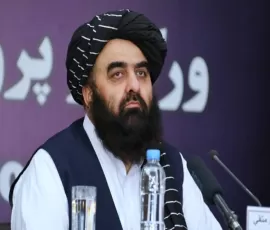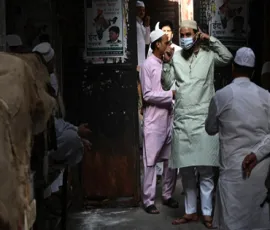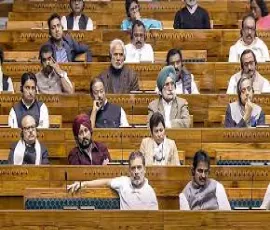-
Deoband and the Taliban: Faith, Diplomacy, and India’s Theological Opportunity
October 24, 2025
Afghanistan’s Foreign Minister Amir Khan Muttaqi, who arrived in India on 9 October 2025 to discuss security and trade with External Affairs Minister S. Jaishankar, among other agendas, also planned a visit to Darul Uloom Deoband in Saharanpur, Uttar Pradesh. The Darul Uloom Deoband seminary is one of South Asia's most significant historical seminaries, holding a stature second only to Al-Azhar University in Cairo, Egypt.
The visit by Muttaqi symbolises the reactivation of a historical, theological, and strategic relationship that binds Afghanistan and India through one of the most influential schools of Islamic thought in South Asia. The Taliban’s effort to associate themselves with the intellectual and spiritual authority of Deoband reflects both their quest for legitimacy and their recognition of India’s place in the genealogy of Islamic scholarship that shaped much of Afghanistan’s religious identity.The Historical Relationship Between Deoband and AfghanistanThe relationship between Darul Uloom Deoband and Afghanistan is deep and long-standing. Founded in 1866 in the town of Deoband in Saharanpur, Uttar Pradesh, the seminary emerged as a centre of Islamic learning that combined moral reform with resistance to colonial modernity. Its founders, Maulana Muhammad Qasim Nanautavi and Rashid Ahmad Gangohi, envisioned a movement of religious revivalism grounded in Hanafi jurisprudence and spiritual discipline. Their objective was to preserve Islamic scholarship in the face of cultural erosion rather than to politicise it.During the famous Silk Letter Movement (1913–1920), Deobandi clerics sought to forge alliances with the Ottoman Empire, Afghanistan, and the German Empire to challenge British rule in India. These links left a lasting imprint on Indo-Afghan religious and political consciousness, binding the two societies through shared intellectual networks.From the late nineteenth century onwards, the seminary attracted students not only from across India but also from Afghanistan, Central Asia, and the frontier regions of present-day Pakistan. Afghan scholars were among the earliest foreign disciples to study at Deoband, returning to Kabul, Kandahar, and Khost to establish madrasas modelled on its curriculum and teaching style. These institutions helped embed the Deobandi ethos defined by scholarship, austerity, and strict adherence to classical texts within Afghan religious life.Even before Partition, Deobandi scholars had engaged Afghanistan in political and religious matters. During the famous Silk Letter Movement (1913–1920), Deobandi clerics sought to forge alliances with the Ottoman Empire, Afghanistan, and the German Empire to challenge British rule in India. These links left a lasting imprint on Indo-Afghan religious and political consciousness, binding the two societies through shared intellectual networks.Afghan Students at Deoband: A Historical Continuum InterruptedThe Afghan students continued to visit the Darul Uloom Deoband up till the mid-twentieth century. After India’s independence and the creation of Pakistan, Afghan enrolments declined but did not disappear. During the 1950s to the late 1970s, young Afghans continued to study at Deoband, often with the patronage of religious foundations or traders who maintained cultural links with India.The Deobandi theology that travelled westward from India was thus transformed. Stripped of its scholastic and reformist spirit, it fused with Pakistan’s strategic imperatives, US-Saudi Cold War funding, and a militant ethos born of the Afghan jihad.This intellectual corridor was abruptly cut off by the Soviet invasion of Afghanistan in 1979. As Kabul descended into conflict, Pakistan became the asylum of millions of displaced Afghans, and Deobandi madrasas on Pakistani soil, most notably Darul Uloom Haqqania in Akora Khattak, emerged as substitutes for the Indian seminary. It was in these Pakistani institutions that the ideological foundations of the Taliban were laid. The Deobandi theology that travelled westward from India was thus transformed. Stripped of its scholastic and reformist spirit, it fused with Pakistan’s strategic imperatives, US-Saudi Cold War funding, and a militant ethos born of the Afghan jihad.By the 1990s, the original Indian Deobandi tradition—textual, scholastic, and inward-looking—had mutated into a political instrument serving Islamabad’s regional strategy. The Taliban movement that arose in 1994 drew upon the symbols and vocabulary of Deobandism but not its intellectual discipline or pluralist restraint. After the fall of the Taliban regime in 2001, a few Afghan nationals resumed religious study in India, though mostly within private or informal settings rather than at Deoband itself. Since the Taliban’s return to power in 2021, there have been no official Afghan admissions, yet the symbolic identification between the movement and Deoband has strengthened rather than faded.The Symbolism of Amir Khan Muttaqi’s Visit to DeobandAmir Khan Muttaqi’s planned visit to Darul Uloom Deoband is loaded with symbolic weight. It would mark the first time a senior Taliban figure of ministerial rank engages, even indirectly, with the Indian source of the group’s ideological lineage. Despite its many mutations and permutations, the Afghan Taliban continues to trace its roots to the Indian Deobandi tradition, albeit as a hybrid form that blends Deobandi thought with Pashtunwali and Wahhabi influences through its association with the Haqqania network. Muttaqi’s visit, therefore, does not follow theological curiosity but represents a carefully calculated act of religious diplomacy.For the Taliban, the visit serves as an attempt to sever its umbilical ties to Pakistan’s Deobandi networks and assert its own ideological authenticity. By publicly associating themselves with Darul Uloom Deoband, they seek to re-establish their credentials as heirs to a scholarly Islamic reform movement rather than as a militant regime. The move also carries geopolitical undertones—an effort to assert independence from Pakistan’s ideological patronage. It allows Kabul to distance itself, at least symbolically, from the influence of Haqqania and Pakistani clergy who have long been perceived as intermediaries of Islamabad’s interests.Despite its many mutations and permutations, the Afghan Taliban continues to trace its roots to the Indian Deobandi tradition, albeit as a hybrid form that blends Deobandi thought with Pashtunwali and Wahhabi influences through its association with the Haqqania network. Muttaqi’s visit, therefore, does not follow theological curiosity but represents a carefully calculated act of religious diplomacy.At the same time, the visit helps the Taliban project a softer image internationally. Deoband in India is known for its moral conservatism but also for its rejectionist approach. Associating with the seminary provides the Taliban with a form of reputational laundering, suggesting openness to reinterpretation and reform. It signals continuity with the broader South Asian Islamic heritage—one that predates Pakistan and transcends political boundaries—while simultaneously asserting autonomy and religious authenticity.India’s Opportunity: Reclaiming Theological InfluenceFor India, the Taliban’s overtures present an opportunity to engage through the very idiom of faith that once divided them. New Delhi has long recognised that Afghanistan’s stability is central to its regional interests. While India’s past engagements with successive Afghan governments have largely centred on infrastructure, development aid, and humanitarian assistance, the current context calls for the addition of a fourth, and more nuanced dimension: religious diplomacy.India’s historical leadership of the Deobandi tradition gives it an intellectual leverage. By re-establishing the classical Deobandi emphasis on knowledge, moral integrity, and peaceful coexistence, New Delhi can quietly influence the theological orientation of the Afghan clergy. Such engagement does not require political recognition of the Taliban regime. Instead, it can take the form of cultural, academic, and clerical exchanges, including online educational programmes that promote critical thinking, comparative jurisprudence, and moderation within religious pedagogy.The framework of the “Four Ds”—Diplomacy, Development, Dialogue, and Deoband offers a blueprint for such engagement. India can communicate its values not as a Westernised democracy exhorting an Islamic government, but as a fellow inheritor of Islamic scholarship that prizes balance and moral restraint.The framework of the “Four Ds”—Diplomacy, Development, Dialogue, and Deoband offers a blueprint for such engagement. India can communicate its values not as a Westernised democracy exhorting an Islamic government, but as a fellow inheritor of Islamic scholarship that prizes balance and moral restraint. By encouraging India’s Deobandi scholars to articulate publicly the irreconcilability of violence with Islamic teaching, India can reclaim the narrative that Pakistan distorted. The original Deoband movement, after all, stood for spiritual reform, education, and national coexistence—values absent from the militant Deobandism propagated in Pakistan.Why the Taliban Continue to Invoke Deoband?The Taliban’s continued reference to Darul Uloom Deoband, despite their institutional affiliations of the past to Pakistan’s Haqqania network, is a cautious act of self-legitimation. While Haqqania shaped their political formation, Deoband provides them with the intellectual genealogy that Pakistan cannot offer. Haqqania, though influential, is seen internationally as the seminary of militancy, shaped by state patronage and jihadist training. Deoband, on the other hand, represents authenticity and orthodoxy, a lineage stretching back to the classical centres of Hanafi learning.By claiming Deoband as their spiritual origin, the Taliban seek to cloak their regime in theological legitimacy and distinguish themselves from Salafist and Wahhabi movements such as ISIS-K. This identification helps them appear as traditionalists rather than radicals, as defenders of an indigenous South Asian Islamic heritage rather than as agents of transnational jihad. The association also serves their diplomatic interest: it signals to India and the wider Muslim world that the Taliban recognise the moral authority of the Indian seminary, thus inviting engagement on cultural and religious grounds.By proclaiming the primacy of its own Deobandi tradition—moderate and scholarly—India can not only counter Pakistan’s narrative but also help steer Afghanistan’s religious discourse toward accommodation and introspection.Conclusion: The Contest for Deoband’s LegacyThe evolving relationship between the Taliban and Darul Uloom Deoband symbolises a broader struggle over the legacy of South Asian Islam. While Pakistan’s madrasas transformed Deobandism into a tool of geopolitical influence, India preserved its theological purity and intellectual depth, even while allowing space for political differences. This divergence has created an opening for India to assert a more commanding role.Dialogue through Deoband provides India with a platform to reorient the Taliban's ideological trajectory without the constraints of formal diplomacy. It allows New Delhi to project soft power rooted in history, culture, and faith. By proclaiming the primacy of its own Deobandi tradition—moderate and scholarly—India can not only counter Pakistan’s narrative but also help steer Afghanistan’s religious discourse toward accommodation and introspection.Muttaqi’s visit to Deoband, therefore, is more than a symbolic act; it represents a moment of theological convergence that could either reinforce old divisions or open new possibilities. If India approaches this opportunity with foresight and determination, it could transform a shared spiritual heritage into a tool for regional stability. In the broader sweep of South Asian history, the contest over the meaning of Deoband may ultimately prove more consequential than the contest over the map of Afghanistan itself.






